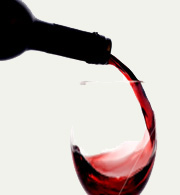|
 |
 |

SINCE THE BEGINNING of civilization, wine has been a source of pleasure to mankind. Wine is one of the first things Man created. No one knows who made the first wine or enjoyed its effect, but it is woven through the tapestry of human history like few other products. It has played many roles—as part of religious ceremonies, as medicine and antiseptic, a water purifier, a transformer of meals into feasts, and as a comforting friend and a courageous partner.
What is wine? If put in sufficiently general terms, wine is the naturally fermented juice of fresh fruit or berries. Wine derived from the juice of grapes will be our focus here. Wine is foremost an agricultural product. With only minor assistance by man, grapes are converted by nature, in a chemical process, into an alcoholic beverage. Using a few skilled techniques, man can create wines of immense variety that can be bottled and transported around the world, and at their best, through time, develop an apparent soul of their own, creating an almost sublime experience.
Today, we know more about wines than ever before. We know how to cultivate the highest quality grapes to produce fine wines, and how to pair them with foods to show both at their very best. We have learned or perhaps rediscovered, wine as a principle source of nourishment and the benefits it can bring when consumed in moderation as part of a healthy diet.
In enjoying wine we connect with history and with those before us who have participated in one of mankinds earliest and simplest pleasures. Educating ourselves about wine and its proper use can only help us to enjoy it to the fullest, and to make it part of a gracious way of life.
|
|
|
 |
 |
SERVING TEMPERATURES
More wine is ruined by being too warm than too cold. A wine that is served too cold is easily warmed, but a wine served too warm can be difficult to chill. Therefore, when in doubt, serve it colder than you might think necessary. A wine that is too warm tastes alcoholic and is not a pleasure to drink.
In general, white wines are served cooler than red wines.

These serving temperatures should be used as guidelines.
65°F / 18°C would be the equivalent of leaving the wine out at room temperature for about 4 hours.
39°F / 4°C can be achieved by leaving the bottle in the refrigerator for about 4 hours. |
65°F / 18°C
Australian Shiraz, California Cabernet Sauvignon, Rhône Wines, Vintage Port
|
63° / 17°C
Bordeaux, Châeauneuf-du-Pape, Ribera delDuero, South African Pinotage and Catalonian, Chilean, and Australian Cabernet
|
61°F / 16°C
Red Côte d'Or Burgandy, southern French Reds, southern Italian reds, Rioja, Toro, Australian and California Pinot Noir, Tawny and Ruby Ports
|
50°F / 15°C
Côte Chalonnaise, Douro red table wines, young Zinfandel, Oregon Pinot Noir, New Zealand Cabernet and Pinot Noir, Oloroso and Cream sherries, Bual and malmsey Maderias
|
|
57°F / 14°C
Chinon, Bourgueil, northern Italian and Washington State Cabernet Sauvignon, Valpolicella, young Chianti
|
|
54° – 55°F / 12 – 13°C
Young Beaujolais, red Sancerre, Bardolino, Lago di Caldaro, young Sanish and Portuguese reds, vin de pays
|
|
50°F / 10°C
California and Australian Chardonnay, Sauternes, top white Côte d'Or Burgundy, sweet German Wines, Rhine and Mosel Kabinett and Spätlese, Tokay, Australian liqueur Muscat, Italian oaked Chardonnay, oaked white Rioja, Fino and Amontillado Sherries, sercial Maderia, white Port
|
|
48°F / 9°C
Good white Pessac-Léognan and Graves, north-eastern Italian whites, Washington State Chardonnay, Chilean Chardonnay, Australian Semillon, New Zealand Chardonnay
|
 |
46°F / 8°C
Alsace, Chablis, Côte Chalonnaise and mâconnais whites, dry German wines, Franken wines, Austrian Riesling, English wines, Australian Reisling, Cabernet and grenache rosé
|
 |
45°F / 7°C
Good Champagne and Sparkling wine, Sancere, new York State, Chilean and New Zealand Sauvignon Blanc
|
 |
43°F / 6°C
White Bordeaux, Muscadet, Anjou, other Sauvignons, Asti, unoaked white Roja
|
 |
41°F / 5°C
Qba German wines, Soave, young Spanish and Portuguese whites, Vinho Verde, Swiss Chasselas, Austrian Grüner Veltliner, cheap rosé
|
 |
36° – 39°F / 2 – 4°C
Cheap sparkling wines
|
|
HOW MUCH WINE SHOULD YOU PLAN FOR?
Number
of Guests: | Item: | Event Length: |
| 2 Hours | 4 Hours |
 |
Wine - 750ml (standard) Bottles | 3 | 4 |
| Ice (pounds) | 2 | 2 |
| Glasses | 6 | 8 |
| Napkins | 12 | 16 |
| Hors d'oeuvres (pieces) | 32 | 64 |
| |
 |
Wine - 750ml (standard) Bottles | 6 | 8 |
| Ice (pounds) | 2 | 4 |
| Glasses | 12 | 16 |
| Napkins | 24 | 32 |
| Hors d'oeuvres (pieces) | 64 | 128 |
|
|
 |
 |
 |
 |
 |
 |
Wine Country Travel Home | Destinations | Enjoying Wine | Dispatches | Basics | Resources | Wine Country Travel Shop

Copyright ©1998-2009 Wine Country Travel All Rights Reserved
All materials contained in http://www.WineCountryTravel.com are protected by copyright and trademark laws and may not be used for any purpose whatsoever other than private, non-commercial viewing purposes. Derivative works and other unauthorized copying or use of stills, video footage, text or graphics is expressly prohibited.
|
 |
|
 |


|